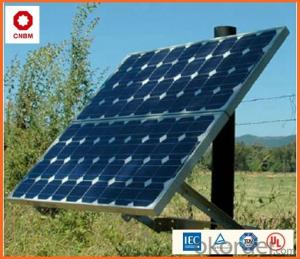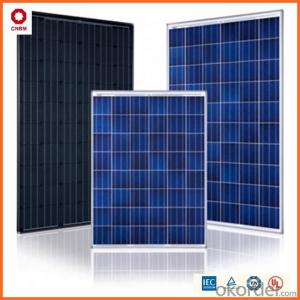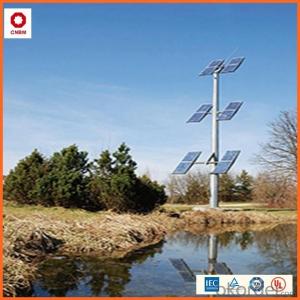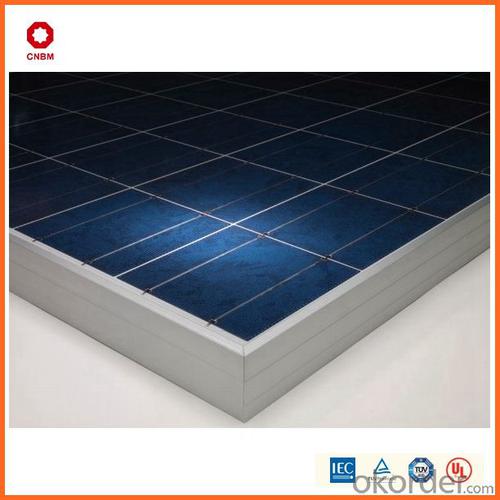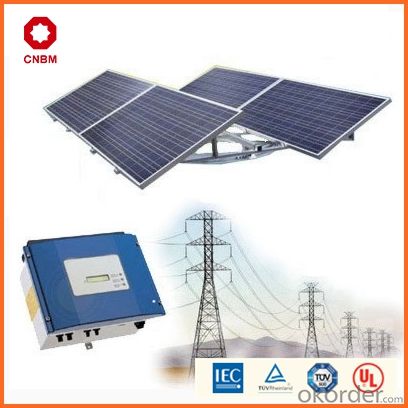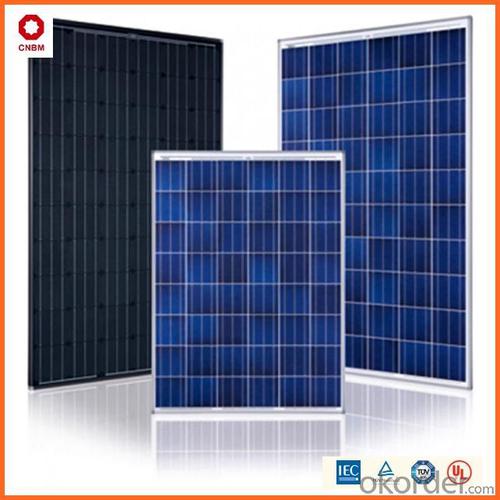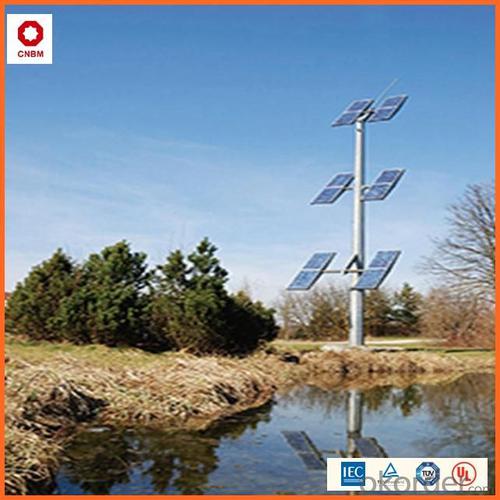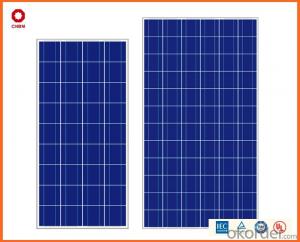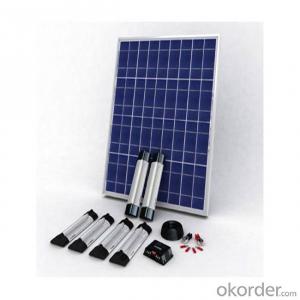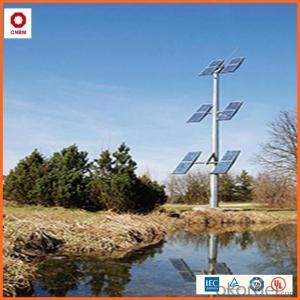Solar Energy Systems Company 65w Poly Small Solar Panels On Stock With Good Quality
- Loading Port:
- China main port
- Payment Terms:
- TT OR LC
- Min Order Qty:
- 1 watt
- Supply Capability:
- 10000000 watt/month
OKorder Service Pledge
OKorder Financial Service
You Might Also Like
Specification
Hot Sale !!! Quality and Safety of Small Poly Solar Panel 25~85w
1. Rigorous quality control meets the highest international standards.
2. High-transmissivity low-iron tempered glass, strong aluminium frame.
3. Using UV-resistant silicon.
4. IS09001/14001/CE/TUV/UL
Warranties of Small Poly Solar Panel 25~85w
1. 10 years limited product warranty
2. 15 years at 90% of the minimal rated power output
3. 25 years at 80% of the minimal rated power output
Specification
Characteristics of Poly solar panels CNBM (25-85W) | |||||
Max Power Voltage Vmp(V) | 30.3 | 30.8 | 31.1 | 31.4 | 31.85 |
Max Power Current Imp(A) | 7.60 | 7.64 | 7.73 | 7.81 | 7.85 |
Open Circuit Voltage Voc(V) | 36.1 | 36.6 | 37 | 37.3 | 37.68 |
Short Circuit Current Isc(A) | 8.50 | 8.55 | 8.65 | 8.75 | 8.85 |
Max Power Pm(W) | 230W | 235W | 240W | 245W | 250W |
Temperature Coefficient of Cells Poly solar panels CNBM (25-85W) | |
NOCT | 45± 2 |
Temperature Coeffucients of Isc | 0.0492 |
Temperature Coeffucients of Voc | -0.3374 |
Temperature Coeffucients of Voc | -0.4677 |
Mechanical Data of Poly solar panels CNBM (25-85W) | |
Dimension | 1638 × 982 × 40 mm |
Weight | 19.5 kg |
No. of Cells and Connections | 60 (6 ×10) |
Tolerance | 0 ~ + 5 W |
Cell | Monocrystalline Cell 156 × 156 mm |
Packing | 624 Pcs/40ft(H) Container |
Limits of Poly solar panels CNBM (25-85W) | |
Operating Temperature | -40 to +85 |
Storage Temperature | -40 to +85 |
Max System Voltage | 1000VDC(IEC) / 600VDC(UL) |
Features of our products:
• High conversion efficiency mono/poly-crystalline amorphous silicon solar cells
• Modules incorporate high performance bypass diodes to minimize the power drop caused by shading
• High transmittance, low-iron tempered glass
• High performance EVA encapsulant to prevent destroying and water.
• AI frame: without screw, corner connection. 8 holes on the frame can be installed easily
• Good performance of preventing from atrocious weather such as wind and hails
• Certifications: CE IEC TUV VDE UL, Class I
• 10 years 90% power output warranty

Shipping of Small Poly Solar Panel 25~85w
By Sea | Delivery from Shanghai or Ningbo seaport |
By Air | Departure from Shanghai Pudong Airport |
By Express | Post by DHL, EMS, UPS, TNT. |
- Q: Can solar energy systems be used for commercial buildings?
- Yes, solar energy systems can be used for commercial buildings. In fact, many businesses are adopting solar power as a sustainable and cost-effective energy solution. Solar panels can be installed on rooftops or as ground-mounted systems to generate electricity, reducing reliance on traditional energy sources and lowering utility bills. Additionally, commercial buildings often have large surface areas suitable for solar panel installation, making them ideal candidates for harnessing solar energy.
- Q: Can a solar energy system be installed on commercial buildings?
- Yes, a solar energy system can certainly be installed on commercial buildings. In fact, many businesses are increasingly adopting solar power systems to offset their electricity consumption and reduce their carbon footprint. With proper planning and design, solar panels can be installed on rooftops or integrated into the building's architecture, providing a sustainable and cost-effective source of energy for commercial establishments.
- Q: Can solar energy systems be used for powering off-grid eco-schools?
- Yes, solar energy systems can be used to power off-grid eco-schools. Solar panels can be installed on the roofs or in open spaces of the eco-schools to generate electricity from sunlight. This renewable energy source can be used to power various electrical appliances, lighting, heating, cooling, and other energy needs of the school. Additionally, excess energy generated during the day can be stored in batteries for use during nighttime or cloudy days, ensuring a continuous power supply. By utilizing solar energy, off-grid eco-schools can reduce their dependence on fossil fuels, lower their carbon footprint, and set an example for sustainable and environmentally friendly practices.
- Q: How do solar energy systems contribute to reducing the need for new power plant construction?
- Solar energy systems contribute to reducing the need for new power plant construction by generating electricity from the abundant and renewable energy of the sun. As these systems harness solar power, they significantly decrease the reliance on traditional power plants that burn fossil fuels, which not only helps to reduce greenhouse gas emissions and combat climate change but also minimizes the demand for building new power plants.
- Q: How do solar energy systems impact the reduction of fossil fuel consumption?
- The reduction of fossil fuel consumption is greatly influenced by solar energy systems. One of the key benefits of solar energy is its utilization of the sun's power, which is a renewable energy source. This implies that solar energy systems do not rely on the burning of fossil fuels like coal or natural gas to generate electricity. By adopting solar energy, we can decrease our dependence on fossil fuels for electricity generation, thereby reducing our carbon footprint and addressing the negative environmental consequences associated with fossil fuel consumption. Additionally, solar energy systems contribute to the reduction of fossil fuel consumption through net metering. Net metering allows individuals or businesses with solar panels to sell any excess electricity generated back to the grid. This means that when solar energy production is high and exceeds the amount being used, the surplus energy is fed into the grid. Consequently, the need for fossil fuel-based power plants to produce electricity to meet demand decreases, resulting in an overall reduction in fossil fuel consumption. Moreover, the adoption of solar energy systems can lead to a decrease in the demand for fossil fuel-based electricity, which can subsequently drive down electricity prices. This price reduction enhances the economic competitiveness of renewable energy, encouraging greater adoption of solar energy systems and further decreasing the demand for fossil fuels. In conclusion, solar energy systems play a crucial role in reducing fossil fuel consumption. By harnessing the sun's energy, solar power systems eliminate the necessity of burning fossil fuels for electricity generation. Through net metering and the potential for price reductions, solar energy systems contribute to the overall reduction of fossil fuel consumption, promoting a cleaner and more sustainable energy future.
- Q: How do solar energy systems impact energy affordability?
- Solar energy systems can have a positive impact on energy affordability by reducing electricity bills for individuals and businesses. By generating their own clean and renewable energy, users can save money on utility costs and potentially even earn money by selling excess energy back to the grid. This increased affordability can help alleviate the burden of high energy expenses, making renewable energy more accessible to a wider range of people.
- Q: Can solar energy systems be integrated into building design?
- Yes, solar energy systems can be integrated into building design. In fact, integrating solar energy systems into building design is becoming increasingly common and is considered a sustainable and cost-effective approach to generating electricity. There are various ways to incorporate solar energy systems into building design, including rooftop solar panels, solar facades, and solar windows. Rooftop solar panels are the most commonly used method of integrating solar energy systems into building design. They can be installed on the roofs of buildings, either as standalone structures or integrated into the roof itself. These panels capture sunlight and convert it into electricity, which can be used to power the building or be fed back into the grid. Solar facades are another way to integrate solar energy systems into building design. These systems involve installing solar panels on the outer walls of buildings. They not only generate electricity but also act as a protective layer, reducing heat gain and improving the building's energy efficiency. Solar windows are a relatively new development in building-integrated solar energy systems. These windows are designed with built-in transparent solar cells that can capture sunlight and generate electricity while still allowing natural light to enter the building. Solar windows have the potential to revolutionize building design by seamlessly integrating renewable energy generation into the building envelope. Integrating solar energy systems into building design offers several advantages. First and foremost, it allows buildings to generate their own electricity, reducing reliance on fossil fuel-based power sources and lowering utility bills. Additionally, it contributes to the reduction of greenhouse gas emissions, promoting a cleaner and more sustainable environment. Moreover, solar energy systems can enhance the aesthetic appeal of buildings, turning them into visually striking examples of sustainable architecture. In conclusion, solar energy systems can indeed be integrated into building design. With various options available, including rooftop solar panels, solar facades, and solar windows, buildings can generate their own clean, renewable electricity, reduce their carbon footprint, and contribute to a more sustainable future.
- Q: What are the different financing options for solar energy systems?
- There are several financing options available for solar energy systems, including purchasing the system outright with cash, taking out a solar loan, leasing the system, or entering into a power purchase agreement (PPA). Each option has its own advantages and considerations, such as upfront costs, ownership of the system, maintenance responsibilities, and potential savings. It is important to research and compare these options to determine which one aligns best with your financial goals and circumstances.
- Q: Can solar energy systems be used for powering remote weather stations?
- Certainly, remote weather stations can indeed utilize solar energy systems for power generation. Solar energy proves to be an eco-friendly and renewable power source, which can be effectively harnessed in isolated regions where it may not be feasible or cost-effective to connect to the electrical grid. The operation of weather stations necessitates a consistent supply of electricity to support their sensors, data loggers, communication devices, and other equipment. The installation of solar panels at these stations allows the capture of sunlight and its conversion into electricity through photovoltaic technology. This electricity can then be stored in batteries, thereby offering a dependable and sustainable power supply for the weather station, even during times of cloudy or nighttime conditions. Furthermore, solar energy systems entail minimal maintenance and possess a long lifespan, rendering them ideally suited for remote locations where regular maintenance visits may pose challenges. In general, the utilization of solar energy systems to power remote weather stations presents a practical and environmentally friendly solution that ensures the uninterrupted operation of these crucial monitoring facilities.
- Q: Can solar energy systems be used for transportation?
- Yes, solar energy systems can be used for transportation. Solar-powered vehicles, such as solar cars, solar boats, and solar planes, have been developed and successfully used for transportation purposes. These vehicles harness the energy from the sun through solar panels, converting it into electricity to power their propulsion systems. While solar energy may have limitations in terms of efficiency and range, advancements in technology are continuously improving the viability of solar-powered transportation.
Send your message to us
Solar Energy Systems Company 65w Poly Small Solar Panels On Stock With Good Quality
- Loading Port:
- China main port
- Payment Terms:
- TT OR LC
- Min Order Qty:
- 1 watt
- Supply Capability:
- 10000000 watt/month
OKorder Service Pledge
OKorder Financial Service
Similar products
Hot products
Hot Searches
Related keywords

